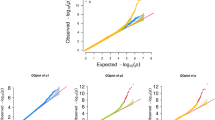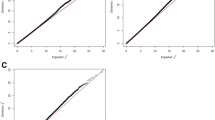Abstract
Summary
We conducted a whole genome linkage scan for quantitative trait loci (QTLs) underlying peak bone mineral density (PBMD). Our efforts identified several potential genomic regions for PBMD and highlighted the importance of epistatic interaction and sex-specific analyses in identifying genetic regions underlying PBMD variation.
Introduction
Peak bone mineral density (PBMD) is an important clinical risk predictor of osteoporosis and explains a large part of bone mineral density (BMD) variation.
Methods
To detect susceptive quantitative trait loci (QTLs) for PBMD variation including consideration of epistatic and sex-specific effects, we conducted a whole genome linkage scan (WGLS) for PBMD using 2,200 Caucasians from 207 pedigrees, aged 20–50 years. All the individuals were genotyped with 410 microsatellite markers. In addition to WGLS in the total combined sample of males and females, we conducted epistatic interaction analyses, and sex-specific subgroup linkage analyses.
Results
We identified several potential genomic regions that met the criteria for suggestive linkage. The most impressing region is 12p12 for hip PBMD (LOD = 2.79) in the total sample. Epistatic interaction analyses found a significant epistatic interaction between 12p12 and 22q13 (p = 0.0021) for hip PBMD. Additionally, we detected suggestive linkage evidence at 15q26 (LOD = 2.93), 2p13 (LOD = 2.64), and Xq27 (LOD = 2.64). Sex-specific analyses suggested the presence of sex-specific QTLs for PBMD variation.
Conclusions
Our efforts identified several potential regions for PBMD and highlighted the importance of epistatic interaction and sex-specific analyses in identifying genetic regions underlying PBMD variation.




Similar content being viewed by others
References
Consensus Development Conference (1993) Bone mass and fracture risk. Am J Med 95:1S–78S
America’s Bone Health (2002) The state of osteoporosis and low bone mass in our nation. National Osteoporosis Foundation
Orsini LS, Rousculp MD, Long SR, Wang S (2005) Health care utilization and expenditures in the United States: a study of osteoporosis-related fractures. Osteoporos Int 16:359–371
Heaney RP, Abrams S, Dawson-Hughes B (2000) Peak bone mass. Osteoporos Int 11:985–1009
Hernandez CJ, Beaupre GS, Carter DR (2003) A theoretical analysis of the relative influences of peak BMD, age-related bone loss and menopause on the development of osteoporosis. Osteoporos Int 14:843–847
Hui SL, Slemenda CW, Johnston CC Jr (1990) The contribution of bone loss to postmenopausal osteoporosis. Osteoporos Int 1:30–34
Kammerer CM, Schneider JL, Cole SA et al (2003) Quantitative trait loci on chromosomes 2p, 4p, and 13q influence bone mineral density of the forearm and hip in Mexican Americans. J Bone Miner Res 18:2245–2252
Karasik D, Cupples LA, Hannan MT, Kiel DP (2003) Age, gender, and body mass effects on quantitative trait loci for bone mineral density: the Framingham Study. Bone 33:308–316
Ralston SH, Galwey N, Mackay I et al (2005) Loci for regulation of bone mineral density in men and women identified by genome wide linkage scan: the FAMOS study. Hum Mol Genet 14:943–951
Deng HW, Deng H, Liu YJ et al (2002) A genomewide linkage scan for quantitative-trait loci for obesity phenotypes. Am J Hum Genet 70:1138–1151
Deng HW, Xu FH, Huang QY et al (2002) A whole-genome linkage scan suggests several genomic regions potentially containing quantitative trait loci for osteoporosis. J Clin Endocrinol Metab 87:5151–5159
Genant HK, Grampp S, Gluer CC et al (1994) Universal standardization for dual x-ray absorptiometry: patient and phantom cross-calibration results. J Bone Miner Res 9:1503–1514
Recker R, Lappe J, Davies K, Heaney R (2000) Characterization of perimenopausal bone loss: a prospective study. J Bone Miner Res 15:1965–1973
Deng HW, Mahaney MC, Williams JT et al (2002) Relevance of the genes for bone mass variation to susceptibility to osteoporotic fractures and its implications to gene search for complex human diseases. Genet Epidemiol 22:12–25
Huang QY, Xu FH, Shen H et al (2004) Genome scan for QTLs underlying bone size variation at 10 refined skeletal sites: genetic heterogeneity and the significance of phenotype refinement. Physiol Genomics 17:326–331
O’Connell JR, Weeks DE (1998) PedCheck: a program for identification of genotype incompatibilities in linkage analysis. Am J Hum Genet 63:259–266
Abecasis GR, Cherny SS, Cookson WO, Cardon LR (2002) Merlin-rapid analysis of dense genetic maps using sparse gene flow trees. Nat Genet 30:97–101
Amos CI (1994) Robust variance-components approach for assessing genetic linkage in pedigrees. Am J Hum Genet 54:535–543
Amos CI, Zhu DK, Boerwinkle E (1996) Assessing genetic linkage and association with robust components of variance approaches. Ann Hum Genet 60(Pt 2):143–160
Almasy L, Blangero J (1998) Multipoint quantitative-trait linkage analysis in general pedigrees. Am J Hum Genet 62:1198–1211
Blangero J, Williams JT, Almasy L (2000) Robust LOD scores for variance component-based linkage analysis. Genet Epidemiol 19 [Suppl 1]:S8–S14
Hamet P, Merlo E, Seda O et al (2005) Quantitative founder-effect analysis of French Canadian families identifies specific loci contributing to metabolic phenotypes of hypertension. Am J Hum Genet 76:815–832
Xiao P, Shen H, Guo YF et al. (2006) Genomic regions identified for BMD in a large sample including epistatic interactions and gender-specific effects. J Bone Miner Res 21:1536–1544
Mukhopadhyay N, Almasy L, Schroeder M, Mulvihill WP, Weeks DE (2005) Mega2: data-handling for facilitating genetic linkage and association analyses. Bioinformatics 21:2556–2557
Camp NJ, Farnham JM (2001) Correcting for multiple analyses in genomewide linkage studies. Ann Hum Genet 65:577–582
Mathias RA, Freidhoff LR, Blumenthal MN (2001) Genome-wide linkage analyses of total serum IgE using variance components analysis in asthmatic families. Genet Epidemiol 20:340–355
Tsukamoto K, Orimo H, Hosoi T et al (2000) Association of bone mineral density with polymorphism of the human matrix Gla protein locus in elderly women. J Bone Miner Metab 18:27–30
Price PA, Thomas GR, Pardini AW, Figueira WF, Caputo JM, Williamson MK (2002) Discovery of a high molecular weight complex of calcium, phosphate, fetuin, and matrix gamma-carboxyglutamic acid protein in the serum of etidronate-treated rats. J Biol Chem 277:3926–3934
Bohlooly Y, Mahlapuu M, Andersen H et al (2004) Osteoporosis in MCHR1-deficient mice. Biochem Biophys Res Commun 318:964–969
Shen H, Zhang YY, Long JR et al (2004) A genome-wide linkage scan for bone mineral density in an extended sample: evidence for linkage on 11q23 and Xq27. J Med Genet 41:743–751
Mochida Y, Parisuthiman D, Yamauchi M (2006) Biglycan is a positive modulator of BMP-2 induced osteoblast differentiation. Adv Exp Med Biol 585:101–113
Parisuthiman D, Mochida Y, Duarte WR, Yamauchi M (2005) Biglycan modulates osteoblast differentiation and matrix mineralization. J Bone Miner Res 20:1878–1886
Dlouhy SR, Christian JC, Haines JL, Conneally PM, Hodes ME (1987) Localization of the gene for a syndrome of X-linked skeletal dysplasia and mental retardation to Xq27-qter. Hum Genet 75:136–139
Zhang W, Amir R, Stockton DW, Van DV I, Bacino CA, Zoghbi HY (2000) Terminal osseous dysplasia with pigmentary defects maps to human chromosome Xq27.3-xqter. Am J Hum Genet 66:1461–1464
Ogawa S, Hosoi T, Shiraki M et al (2000) Association of estrogen receptor beta gene polymorphism with bone mineral density. Biochem Biophys Res Commun 269:537–541
Scariano JK, Simplicio SG, Montoya GD, Garry PJ, Baumgartner RN (2004) Estrogen receptor beta dinucleotide (CA) repeat polymorphism is significantly associated with bone mineral density in postmenopausal women. Calcif Tissue Int 74:501–508
Mayr-Wohlfart U, Kessler S, Knochel W, Puhl W, Gunther KP (2001) BMP-4 of Xenopus laevis stimulates differentiation of human primary osteoblast-like cells. J Bone Joint Surg Br 83:144–147
Peng H, Wright V, Usas A, Gearhart B, Shen HC, Cummins J, Huard J (2002) Synergistic enhancement of bone formation and healing by stem cell-expressed VEGF and bone morphogenetic protein-4. J Clin Invest 110:751–759
Bayoumi R, Saar K, Lee YA et al (2001) Localisation of a gene for an autosomal recessive syndrome of macrocephaly, multiple epiphyseal dysplasia, and distinctive facies to chromosome 15q26. J Med Genet 38:369–373
Eyre S, Roby P, Wolstencroft K et al (2002) Identification of a locus for a form of spondyloepiphyseal dysplasia on chromosome 15q26.1: exclusion of aggrecan as a candidate gene. J Med Genet 39:634–638
Gleghorn L, Ramesar R, Beighton P, Wallis G (2005) A mutation in the variable repeat region of the aggrecan gene (AGC1) causes a form of spondyloepiphyseal dysplasia associated with severe, premature osteoarthritis. Am J Hum Genet 77:484–490
Sano M, Inoue S, Hosoi T et al (1995) Association of estrogen receptor dinucleotide repeat polymorphism with osteoporosis. Biochem Biophys Res Commun 217:378–383
Laflamme N, Giroux S, Loredo-Osti JC et al (2005) A frequent regulatory variant of the estrogen-related receptor alpha gene associated with BMD in French-Canadian premenopausal women. J Bone Miner Res 20:938–944
Yamada Y, Ando F, Niino N, Shimokata H (2003) Association of polymorphisms of interleukin-6, osteocalcin, and vitamin D receptor genes, alone or in combination, with bone mineral density in community-dwelling Japanese women and men. J Clin Endocrinol Metab 88:3372–3378
Murray RE, McGuigan F, Grant SF, Reid DM, Ralston SH (1997) Polymorphisms of the interleukin-6 gene are associated with bone mineral density. Bone 21:89–92
Roschger P, Matsuo K, Misof BM et al (2004) Normal mineralization and nanostructure of sclerotic bone in mice over expressing Fra-1. Bone 34:776–782
Bollerslev J, Wilson SG, Dick IM et al (2005) LRP5 gene polymorphisms predict bone mass and incident fractures in elderly Australian women. Bone 36:599–606
Sobacchi C, Vezzoni P, Reid DM et al (2004) Association between a polymorphism affecting an AP1 binding site in the promoter of the TCIRG1 gene and bone mass in women. Calcif Tissue Int 74:35–41
Karasik D, Myers RH, Cupples LA et al (2002) Genome screen for quantitative trait loci contributing to normal variation in bone mineral density: the Framingham Study. J Bone Miner Res 17:1718–1727
Ioannidis JP, Ng MY, Sham PC et al (2007) Meta-analysis of genome-wide scans provides evidence for sex- and site-specific regulation of bone mass. J Bone Miner Res 22:173–183
Lee YH, Rho YH, Choi SJ, Ji JD, Song GG (2006) Meta-analysis of genome-wide linkage studies for bone mineral density. J Hum Genet 51:480–486
Acknowledgements
Investigators of this work were partially supported by grants from NIH (K01 AR021170-01, R01 AR45349-01, and R01 GM60402-01A1) and an LB595 grant from the State of Nebraska. The study was also benefitted from grants from National Science Foundation of China, Huo Ying Dong Education Foundation, Hunan Province, Xi’an Jiaotong University, and the Ministry of Education of China. The genotyping experiment was performed by Marshfield Center for Medical Genetics and supported by NHLBI Mammalian Genotyping Service (Contract Number HV48141).
Author information
Authors and Affiliations
Corresponding author
Additional information
Feng Zhang and Peng Xiao contributed equally to this article
Rights and permissions
About this article
Cite this article
Zhang, F., Xiao, P., Yang, F. et al. A whole genome linkage scan for QTLs underlying peak bone mineral density. Osteoporos Int 19, 303–310 (2008). https://doi.org/10.1007/s00198-007-0468-z
Received:
Accepted:
Published:
Issue Date:
DOI: https://doi.org/10.1007/s00198-007-0468-z




